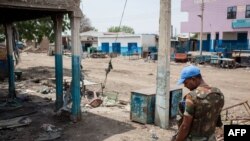South Sudan's government says fighting at an army base in the capital has been "contained" but only after five soldiers were killed and scores of others injured.
A government spokesman, Michael Makwei Lueth, says Wednesday's clashes at the Giada army barracks on the outskirts of Juba were unrelated to the ongoing conflict between the government and rebel forces.
“What happened today in the army general headquarters is nothing but a normal thing that happens in any military area. And it has nothing to do with the rebellion,” he said.
The army's information and public relations director, Malak Ayuen Ajok, said the fighting stemmed from questions over unpaid salaries and what he called a misunderstanding between the soldiers themselves.
He says other soldiers from outside the barracks intervened and put an end to the fighting.
The Giada barracks are where the country's current conflict began December 15 with a clash between members of the presidential guard. The fighting set off weeks of political and ethnic violence across South Sudan that left thousands dead and forced hundreds of thousands from their homes.
The government and rebel forces signed a cease-fire in Ethiopia in January but clashes have continued.
The unrest has led to a cut in South Sudan's oil production, which could be affecting the government's ability to pay soldiers.
Fears of renewed violence in the capital Wednesday prompted many shops to close early. Soldiers have been deployed along the city's main roads.
Government officials acknowledged the fighting caused many residents of Juba to panic, and is urging people to go about their normal activities.
A government spokesman, Michael Makwei Lueth, says Wednesday's clashes at the Giada army barracks on the outskirts of Juba were unrelated to the ongoing conflict between the government and rebel forces.
“What happened today in the army general headquarters is nothing but a normal thing that happens in any military area. And it has nothing to do with the rebellion,” he said.
The army's information and public relations director, Malak Ayuen Ajok, said the fighting stemmed from questions over unpaid salaries and what he called a misunderstanding between the soldiers themselves.
He says other soldiers from outside the barracks intervened and put an end to the fighting.
The Giada barracks are where the country's current conflict began December 15 with a clash between members of the presidential guard. The fighting set off weeks of political and ethnic violence across South Sudan that left thousands dead and forced hundreds of thousands from their homes.
The government and rebel forces signed a cease-fire in Ethiopia in January but clashes have continued.
The unrest has led to a cut in South Sudan's oil production, which could be affecting the government's ability to pay soldiers.
Fears of renewed violence in the capital Wednesday prompted many shops to close early. Soldiers have been deployed along the city's main roads.
Government officials acknowledged the fighting caused many residents of Juba to panic, and is urging people to go about their normal activities.





